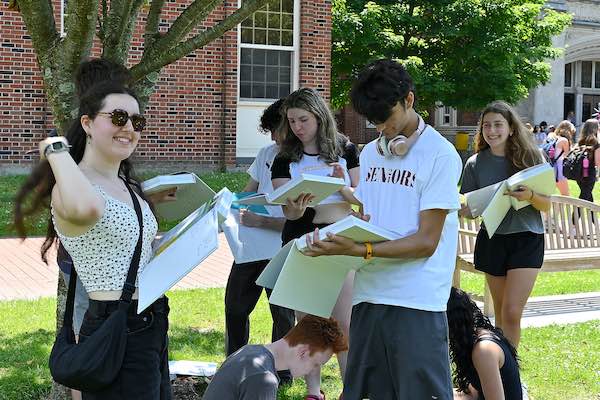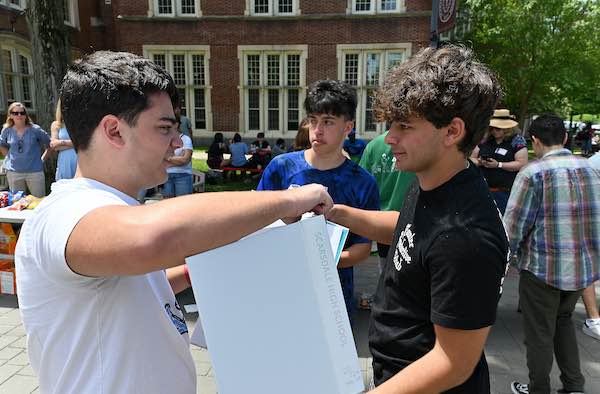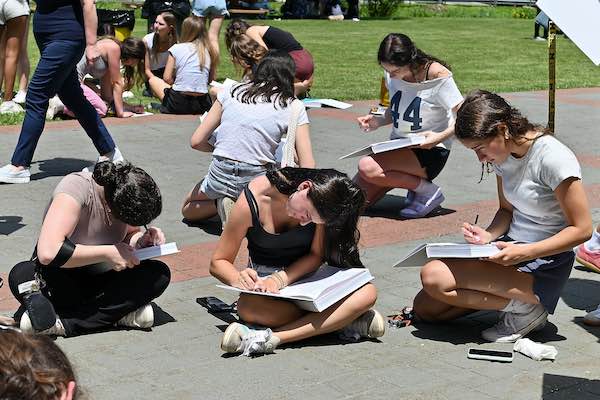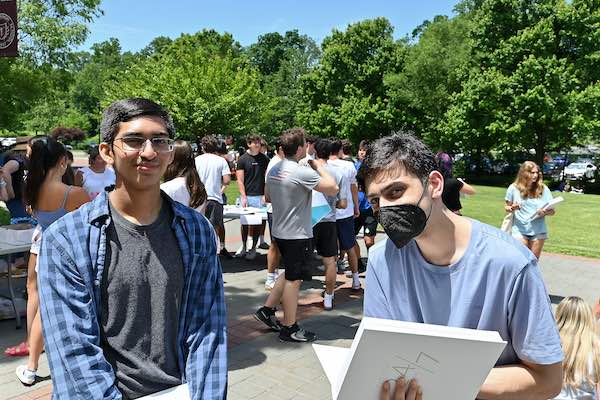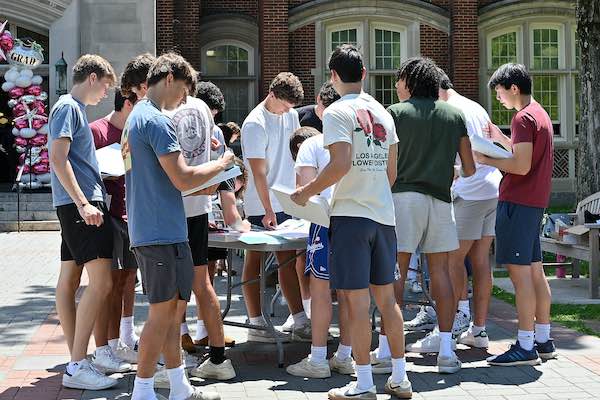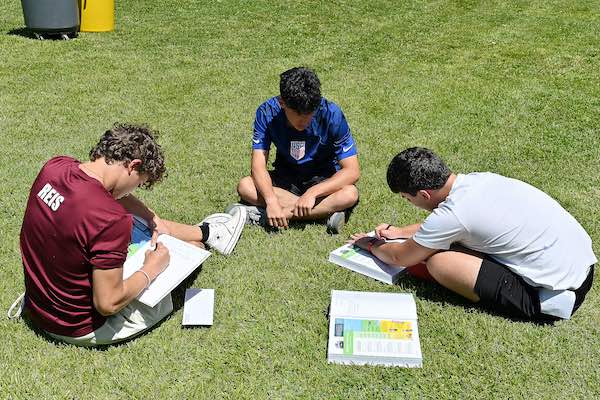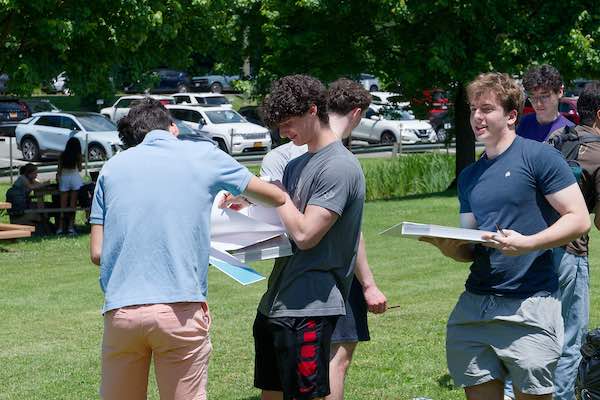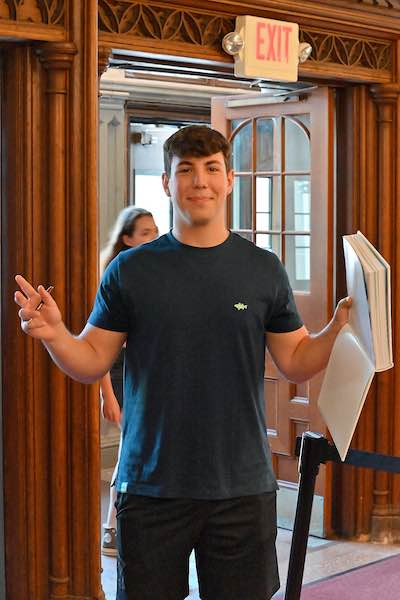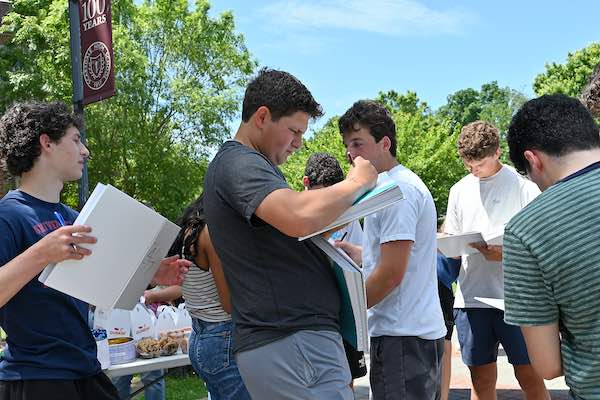Introducing Cindy Parrott: The First Female Athletic Director for SHS
- Details
- Written by Joanne Wallenstein
- Hits: 1986
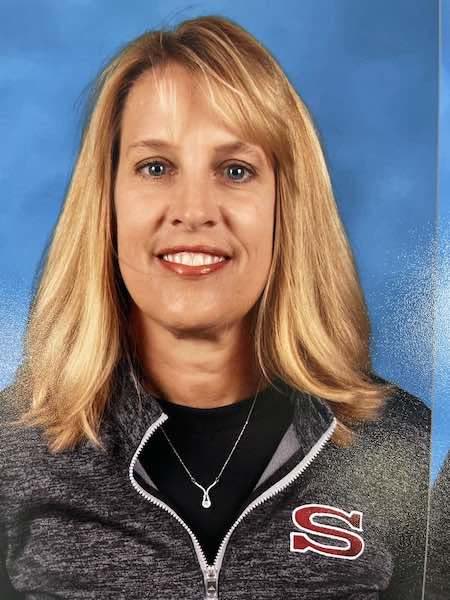 Last week we learned that Cindy Parrott, a teacher and coach in the Scarsdale Schools, had been named the first female athletic director for Scarsdale High School. She takes over from Ray Pappalaridi who will focus on Physical Education and Health.
Last week we learned that Cindy Parrott, a teacher and coach in the Scarsdale Schools, had been named the first female athletic director for Scarsdale High School. She takes over from Ray Pappalaridi who will focus on Physical Education and Health.
We contacted Parrott to learn more about her and here is what she shared:
-Tell us about yourself, your educational experience and your work history at the Scarsdale Schools.
I have been teaching math at Scarsdale Middle School for the past 21 years, serving as the Teacher-in-Charge of Choice for 17 years and the Math Department Chair concurrently for 11 years. I have also coached Modified Volleyball at SMS for 20 years and that program has been extremely popular with 80 - 120 girls participating each season. Prior to teaching in Scarsdale, I coached Girls Volleyball and Softball at Staples High School in Westport, CT.
-What sports have you coached and what sports do you play?
As mentioned, I coached modified volleyball in Scarsdale and high school volleyball and softball in my previous position in Westport, CT for eight years. I played softball since childhood and continued to play recreationally into my forties. As an adult, I took up running, finishing countless 5 and 10ks (placing in my age group in some!), several half marathons, and the New York City Marathon. Recently, I have been playing and enjoying pickleball.
-How big is the high school’s current program? How many teams and how many athletes are involved? What are your thoughts on managing a program of this size?
Scarsdale has 39 teams with approximately 1500 student-athletes participating! It’s definitely a bigh job to address all of the needs of the robust offerings available to SHS students, but I look forward to that challenge. I really look forward to seeing students shine outside of the classroom!
-What attracted you to this new opportunity — what do you believe you can offer the athletes and parents in the high school community?
I have been teaching middle school math for a total of 29 years, supporting students in their academic pursuits. Sports has meant a great deal to me and my family so it is a natural transition for me to now support students in their athletic pursuits.
In my current roles I have had to be extremely organized, detail-oriented, and communicative. I understand the privilege of having worked here for decades and I hope parents and athletes will see how much I care. I will work with coaches and staff to foster the development of student-athletes, promote positive sportsmanship, and help ensure that the lessons learned from Athletics extend far beyond one’s years on the field.
-Recruiting and managing coaches is one of the responsibilities of the job. What will you look for when hiring coaches?
Hiring staff has been one of the duties of my previous position that I enjoyed the most. Scarsdale is fortunate to attract the best and most talented teachers and I am proud of the group that has been hired during my tenure as math department chair. I look forward to continuing that with the athletics coaching staff. Obviously, you want to see their experience, knowledge of the sport, and communication and leadership skills. However, I also want to see a commitment and passion for the Scarsdale community. Our teachers can be our best resources for coaching positions as they are already invested in our student-athletes. If they are not available and we look to hire from outside our staff, then I would like to know why Scarsdale. Do they have a sense of the community and an understanding of what it means to wear maroon and white?
-What are you looking forward to?
With so many teams and limited space, I am looking forward to the results of the field study and seeing how we can provide Scarsdale athletes with facilities we can be proud of. I would like to see if there are opportunities for efficiencies with communication of schedules, events, and any necessary changes that can occur. I really look forward to supporting coaches and student-athletes to be sure they have everything they need to be successful.
-You will be Scarsdale’s first female athletic director. What might this mean for the students and the program?
Being the first female athletic director in Scarsdale is not lost on me. While there has been progress, women are still underrepresented in sports leadership. Hopefully, I bring a different perspective on things and equity will always be a priority. I believe Scarsdale is well positioned in this area, but there are some areas for improvement. Regardless of gender, I hope I am viewed as someone who does the job well.
Commenting on the change in leadership, Moira Crouch and Amy Frank who lead booster organization Maroon and White said this: "Maroon and White has supported Scarsdale High School athletics since 1968. In the 9 years of working together, Maroon and White and Mr. Pappalardi have successfully collaborated to accomplish a great deal for Scarsdale High School’s athletics, including the lights, speakers, windscreens and portable scorers box at Butler field, the fitness center and equipment, the softball scoreboard and windscreens at Supply field, all new banners in the gym, a new sign and flags celebrating our state champions by the Athletic Circle, and other equipment, projects and events. Maroon and White has had a strong partnership with Raymondo Pappalardi and admire his dedication to Scarsdale athletics. We look forward to working with the new athletic director, Cindy Parrott, to continue our mission in support of Scarsdale’s student athletes."
Seniors Look Back and Forwards on Transition Day
- Details
- Written by Joanne Wallenstein
- Hits: 822
 After recovering from the prom celebration, SHS students enjoyed another rite of passage at Senior Transition Day on Monday June 3.
After recovering from the prom celebration, SHS students enjoyed another rite of passage at Senior Transition Day on Monday June 3.
Now that most know where they will be attending college, they listened with interest to a panel discussion from ten college freshman who had just completed their first year at school. What to expect? First, a lot of walking as most freshman don’t head off to school with their cars. About roomates? The veterans advised that your roommate does not have to be your best friend – just someone you can live with. About the work, the freshman said that the rigorous Scarsdale curriculum had prepared them well for college level work.
Following the panel discussion in the auditorium seniors broke out for smaller discussions with their Deans. Some Deans offered advice, while others had their students write thank you notes to teachers. Students received time capsule letters that they had written to their future selves upon entering high school in ninth grade.
The social part of the day started at noon, when everyone received their yearbooks and exited out of the Brewster Road doors for lunch and yearbook signing. They enjoyed a true hometown lunch with sandwiches from Gianonni’s, with chips and various homemade and custom desserts baked by PTA members.
The PTA created an hour-long photo montage with photos of the class members from their elementary years forward, which ran on a continuous loop on a big screen TV with music playing as the seniors ate and signed yearbooks through 2:30pm.
It was a relaxing day to look back on their experiences in school and forward to what's to come in college.
Photo Credit: Matthew Hill
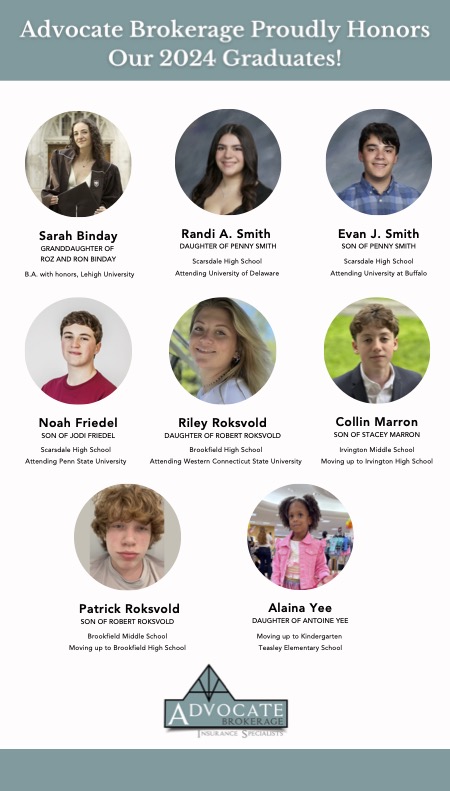
Scarsdale Boys Lacrosse Wins Section 1 Quaterfinal
- Details
- Hits: 917
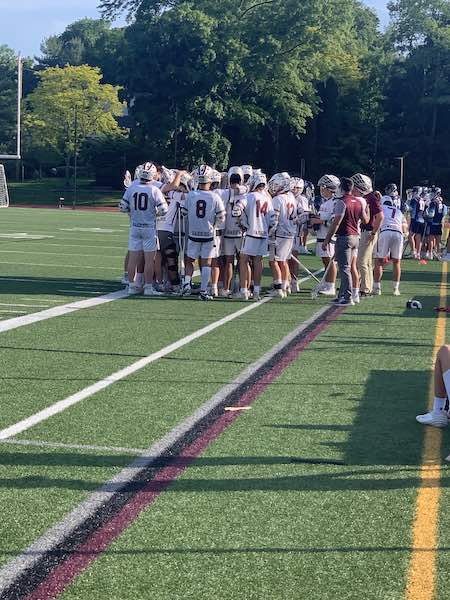 The Raider’s Lacrosse team has begun their playoff journey to win the section championship once again. Their first game was the quarterfinals on May 20th against Suffern High School on the Raiders' home turf.
The Raider’s Lacrosse team has begun their playoff journey to win the section championship once again. Their first game was the quarterfinals on May 20th against Suffern High School on the Raiders' home turf.
The Raiders were able to set the tone in the first quarter with a goal from Junior #8 Jackson Starr. Following that, Sophomore Collin Brennan was able to further the cushion for Scarsdale by scoring shortly after Starr. However, right before the second quarter began, Suffern was able to get on the board making the score 2-1 for the Raiders.
No doubt, the most valuable player for the Raiders during the second quarter was senior #20 Ben Froome. While not being one of the top scorers for the team throughout the season, he was one of their best in this match. He scored 2 consecutive goals early on in the quarter making the score 4-1. Although behind, Suffern had made use of their opportunities by scoring 2 quick goals right before the end of the second quarter. The score at halftime was 4-3 in favor of Scarsdale.
Unlike the first 2 quarters where the first part was in full domination by Scarsdale, there was constant back and forth. Froome continued his streak of goals with another giving him a hat-trick, but shortly after Suffern scored 2 consecutive goals to tie the game at 5-5. However, the Raiders quickly regained their lead. Senior Captain #6 Jake Goldstein, who had just returned from injury, scored shortly after Suffern made the game even, putting the Raiders up once again. Shortly after, Senior Captain #25 Rhett Needleman got 2 consecutive goals at the end of the third quarter. The score at this point was 8-5 for Scarsdale and they had momentum on their side.
To seal the deal, Senior #15 Trevor Knopp got his first goal of the game followed by another from Junior #9 Anders Burrows, putting the Raiders up 10-5. While Suffern would score one more time, it wouldn’t be enough to come back.
The Raiders triumphed with a final score of 10-6.
Some performances well worth noticing are Froome’s 3 goals, Golstein’s one goal and six assists and Needleman’s 3 goals. Scarsdale will move on toward the Section 1 semi-final against Carmel on May 23.
Promposals from the Class of 2024
- Details
- Written by Joanne Wallenstein
- Hits: 3244
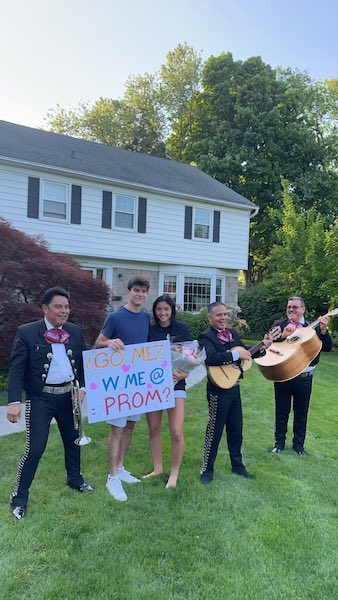 The Scarsdale High School Prom is on Thursday May 30, 2024 and some clever seniors are finding novel ways to ask their dates to go with them to the big night. Here are photos of just a few “promposals.” Do you have one to share? Email us at scarsdalecomments@gmail.com and we’ll include it here.
The Scarsdale High School Prom is on Thursday May 30, 2024 and some clever seniors are finding novel ways to ask their dates to go with them to the big night. Here are photos of just a few “promposals.” Do you have one to share? Email us at scarsdalecomments@gmail.com and we’ll include it here.
Wishing everyone a wonderful evening.
Marc Hajjar hired a mariachi band to serenade Emilia Gomez and held a sign that said, “Will you GO MEZ with me to prom?
 Will Nicholl proposed to equestrian Yuri Sato on horseback asking her to ride to prom with him
Will Nicholl proposed to equestrian Yuri Sato on horseback asking her to ride to prom with him
 Zach Rosenberg rented a uhaul van for his promposal to Mili Fukada . It says, "Will UHAUL by ass to prom?"
Zach Rosenberg rented a uhaul van for his promposal to Mili Fukada . It says, "Will UHAUL by ass to prom?"
 Daniel Hoey asked Annika Fuehrer if she would “Spke” to go to prom with him?
Daniel Hoey asked Annika Fuehrer if she would “Spke” to go to prom with him?
 And Jose Alava asked flag football star Ivy Boockvar “Will QB my date to Prom?
And Jose Alava asked flag football star Ivy Boockvar “Will QB my date to Prom?
Send your promposal photos to scarsdalecomments@gmail.com to feature on Scarsdale10583.
More Questions About Fifth Grade Gender Curriculum at 5-6 Board Meeting
- Details
- Written by Wendy MacMillan
- Hits: 3279
 While the highlight of the Board of Education Meetings on Monday May 6th, may have been the celebration of 24 Scarsdale faculty members being awarded tenure, the Business Meeting directly following that celebration was full of updates, reminders, and public comments.
While the highlight of the Board of Education Meetings on Monday May 6th, may have been the celebration of 24 Scarsdale faculty members being awarded tenure, the Business Meeting directly following that celebration was full of updates, reminders, and public comments.
After weeks of long Public Comment periods with community members giving voice to their thoughts about the proposed school budget, Colby Mulvey was the only one to take the podium at Monday’s meeting. In a prepared statement, Mulvey shared:
“I wanted to speak today about the district and parents being, “In Partnership”, as we read so often in our emails.
I believe it to be vital to our school community that parents of students truly feel like we are in a trusting partnership with teachers and school administrators. But, with the recent discussions regarding the new 5th grade gender curriculum, I have learned of things that have eroded that trust.
I personally feel that 5th grade is too young to introduce gender in school. It is a very complex and nuanced topic. I would have rathered that the district have spoken to parents and guardians directly and encouraged the families to speak to their own children to deliver the messages at a time and in a way that parents felt was appropriate to their children. But leaving that aside….
In seeking to understand more about the new addition to the curriculum, I learned that the district is choosing to follow a specific guidance from New York State on students expressing gender dysphoria. I emphasize guidance, as it is NOT A NYS MANDATE.
This guidance suggests that the district withhold information from parents if their child expressed questions about their gender. In short, the school is willing to socially transition a child and keep it a secret from the parents. This does not feel like a partnership. In comparison, would a teacher withhold a bad grade from parents at the student’s request? I would expect not. Arguably, a child in distress about their gender is much more important for parents to know about versus a bad grade.
The district is also arbitrarily implementing this guidance. For example, I am told the school will QUOTE “work directly with families of students who describe gender dysphoria” END QUOTE if those students are in the 5th grade. So there is a choice to NOT follow the NYS guidance in this instance… but in other grade levels the district WILL be following the guidance?? It seems very incohesive.
The new curriculum for the 5th grade has apparently been developed with the input of an organization called Center Lane. Center Lane states on its website that QUOTE “LGBTQIA+ youth are one of the few marginalized communities not raised by their own people” END QUOTE. This sentiment strikes me as very anti-family and as a parent, I find it insulting. I have concerns how guidance which flows from this type of belief fosters a partnership between parents and Scarsdale Schools.
True PARTNERSHIP relies on trust. The idea that the school is prepared to withhold vital and essential information about our kids and their mental well being breaks this trust in fundamental ways.
Thank you.”
After listening to her statement, Dr. Drew Patrick said he would be happy to arrange a meeting with Ms. Mulvey to further discuss her concerns.
Board of Education President, Ron Schulhof began the Business Meeting by extending a congratulations to all those who earned tenure earlier in the evening. Schulhof then described a meeting the BOE had with Scarsdale High School student representatives. In the meeting Schulhof said they discussed four topics including: The Rolling Gradebook, The Students’ Sense of Belonging and Wellbeing, Cell Phones, and Civil Discourse (a student-led initiative). Schulhof praised the student representatives for their thoughtfulness and encouraged all students to reach out to the BOE with their questions and concerns noting it is important for them to have students’ perspective and feedback.
Schulhof also made note that the BOE, and members of the administration, have been attending many events around the district to disseminate information about the proposed budget and the upcoming vote on May 21st. Schulhof reminded those in attendance that voting will be held at Scarsdale Middle School gym from 7am to 9pm and parking will be made available in the lower circle.
Before handing things over to Superintendent Dr. Drew Patrick, Schulhof announced that the New York State Budget Aid has been officially restored and thanked representatives like Amy Paulin for tirelessly advocating on behalf of our district.
In addition to sharing several highlights from happenings at each of our schools, Dr. Patrick called attention to a number of special dates in May:
-May 1st Principal’s Day
-May 5th Holocaust Remembrance Day
-May 7th Teacher Appreciation Day
-May 8th National Nurses Day
-May 5th-11th Public Service Recognition Week
-May 12th Mother’s Day
-May is Mental Health Awareness Month
Dr. Patrick shared his appreciation and gratitude for all of our district’s hardworking and dedicated principals and assistant principals, teachers, nurses, and public servants such as the members of the BOE.
Auditorium Bids
In his cabinet update, Mr. Andrew Lennon announced that the bid for the Auditorium Project has been published and he hopes to get approval by May 23rd. He also said that the committee has started to select materials for the project and some of those items are on display outside of the auditorium at the high school.
Field Study
Lennon also announced that the Field Study is currently underway and that physical locations have been visited and that a community forum will be held on May 23rd at 7pm at the Village Hall to update the community and to provide an opportunity for questions and feedback.
District Safety
Another notable announcement from the meeting included an update from Dr. Patrick about the district’s Safety and Emergency Management Plan. Patrick informed those present that an updated annual plan will be adopted on June 10th. Discussions of changes to the current plan include new swatting and elopement policies. He also described that there is a 30 day comment period before the June 10th adoption and encouraged our community to provide their feedback.
What exactly is “swatting” and “elopement?” Assistant Superintendent Eric Rauschenbach explained,
“Swatting: calling Districts with the intent to cause panic by reporting ongoing violence and/or a plan for such.
Elopement: Student running away from the school.
The State has required these be elevated to annexes in the plan (emergency specific procedures) because of the rise in the swatting incidents across NYS over the past 3-4 years. We have had processes for dealing with this type of incident since its increase but this just formalizes the procedure. Elopement was added as well to formalize how the District would respond if a child were to run away. Again this is a situation which our schools have discussed and trained around for a long time.
To be clear the actual annexes are additions to the Building Emergency Plans not additions to the public facing plan (except for the listing of their existence). All of our emergency annexes contain specific procedures that are kept confidential.”
To watch the meeting in its entirety and to learn about items such as the BOE’s Leadership Succession Plan, their Self-Evaluation Process, and the Superintendent’s Evaluation Process, please see here (https://vimeopro.com/scarsdaleschoolstv/boe2324)














